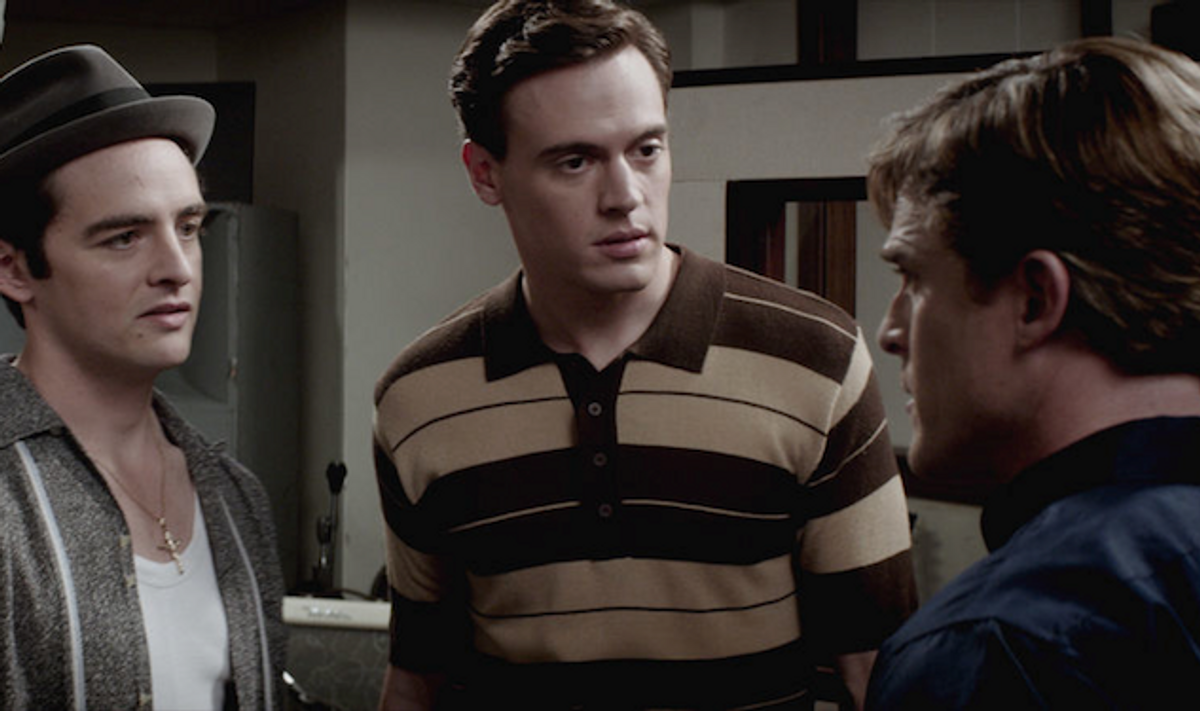
Clint Eastwood portrays things—people—as stereotypes even if he’s not meaning to be defamatory. Is this his movie to watch gays by?
June 19 2014 5:05 PM EST
May 01 2018 11:46 PM EST
By continuing to use our site, you agree to our Private Policy and Terms of Use.

It's a "Where are we now?" moment in Jersey Boys when actor Mike Doyle swishes into view playing legendary record producer Bob Crewe. And his opening line is certified camp: "Hey, watch your mouth, Toto! You're not in Newark anymore!"
We need a narrative GPS device to figure out where this biopic about '60s rock group The Four Seasons is heading. All its post-Sopranos Italian-American carrying-on is briefly disrupted by an apparently gay, smiley, blond-bouffant man challenging the dark-haired machos in his vicinity and running things. We expect his next line to be "You better work, bitch!" And it virtually is: As in real life, Crewe put lead singer Frankie Valli and his group mates through their paces, turning out made-to-order pop hits, all through Crewe's flamboyant savvy.
This camp characterization briefly jolts Jersey Boys to life. Whenever Doyle/Crewe appears, it so jars the film's reverential nostalgia for old-time, white bread rock 'n' roll that you wonder what director Clint Eastwood is up to. It's comic relief--and stereotyping--but it's also a favorable portrait of Crewe as a talented music professional. Some viewers might be more curious about actor Joseph Russo doing a half-tongue-in-cheek impersonation of the young, pre-fame Joe Pesci but figuring out the Bob Crewe performance spotlights Eastwood's curious, unfathomable social ideas. He turns Friend of Dorothy into Friend of Bob.
It's clear that Crewe's flamboyance signifies Eastwood's acceptance--in the face of whatever notions viewers have about the music industry, American pop history, gay-and-straight collaboration. But Eastwood's deal-with-it blatancy also recalls his casting of Georgia drag queen Lady Chablis in Midnight in the Garden of Good and Evil (1997), a film otherwise so full of cliches and stereotypes it would be easy to mistake its stupidity for bigotry.
Gay representation is not a matter for politically-correct balance (one out-and-proud drag artiste for every handful of closeted-gay psychotics in Midnight; one sexually undeclared power broker for four hat-in-hand straights in Jersey Boys). Eastwood's matter-of-fact acceptance is surely the way to go but a problem arises from the shallowness of all the characters. Eastwood portrays things--people--as stereotypes even if he's not defamatory.
Too bad Jersey Boys doesn't get into its characters' artistry (Crewe was a major producer/songwriter involved with classics from LaBelle's "Lady Marmalade" to the famous instrumental "Music to Watch Girls By"). Neither does Jersey Boys highlight the hidden history that Crewe's composition "Can't Take My Eyes Off You" became a huge Four Seasons hit but he actually wrote it from male-to-male experience. That now-famous legend is a more interesting historical event than all the Four Seasons rodomontade.
It took artists of Pet Shop Boys' caliber to give Crewe his due when they recorded "Can't Take My Eyes Off You" as a medley with U2's "Where the Streets Have No Name" in 1991. The Pets' mashup knowingly sanctioned the universality of gay and straight pop love songs, revealing a grand and proud anthem. Eastwood's way-late acknowledgement of Crewe merely (to quote U2) reaches out and touches the flame.
Jersey Boys in theaters now.
Sexy MAGA: Viral post saying Republicans 'have two daddies now' gets a rise from the right